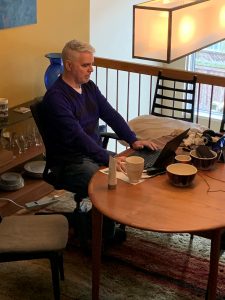By David Phipps, York University
David Phipps tweets as @mobilemobilizer reflecting on his use of social media on the go and more recently his international networking on research impact. But in a world shut down due to COVID-19 this mobilizer is less mobile but no less active because the need to move research into action has never been more urgent.

There I am. Sitting in my home office (otherwise known as the dining room table), usually with the (“aggressively affectionate”) cat fighting for my lap and grudgingly accepting to sit on the chair next to me. It took 7 full days of emergency planning to get the Division of VP Research & Innovation at York University on line and working from home. And here we will stay until the crisis passes.
But this crisis underscores the importance of the work we do as knowledge mobilizers. CIHR funded an insanely quick turn around (application to peer review to results in about one month) of COVID-19 research projects funded with an amazing $52.6M. On March 11, 2020 the Trudeau Government announced an additional $275M to support research into antivirals, vaccine development and support for clinical trials.
There are two elements of knowledge mobilization that must underpin this research:
- It must be partnered early so the results don’t have to be transferred to end users but are co-created with end users (industry, government, community) so that results are ready to be used to inform new products, policies and services. As Bowen and Graham pointed out in 2013 the failure to bridge the “knowledge to action” gap is not a failure of knowledge transfer but a failure of knowledge production. Practice engaged scholarship and perform your research with partners who will use the results of your research.
- And more important than ever, this research cannot sit in peer reviewed publications. Indeed, it cannot even wait for peer review. The results of the research should be made immediately open and available to those who can do their own critical assessment of the science using an open publishing platform like Emerald Open Research where a pre-review manuscript is published in a matter of days.
More than ever institutions need to connect this research and our researchers to organizations that can immediately use the results of research to meet the needs of local and global communities. Even though I am no longer mobile I am still mobilizing.